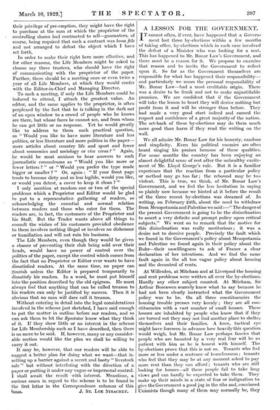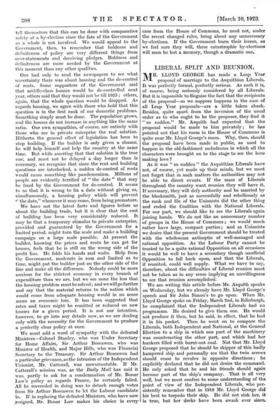A LESSON FOR THE GOVERNMENT.
IT cannot often, if ever, have happened that a Govern- ment lost three by-elections within a few months of taking office, by-elections which in each case involved the defeat of a Minister who was looking for a seat. This has happened to Mr. Bonar Law's Government, and there must be a reason for it. We propose to examine that reason and to invite the Government to reflect upon it. So far as the Government themselves arc responsible for what has happened their responsibility— and particularly we mean the personal responsibility of Mr. Bonar Law—had a most creditable origin. There was a desire to be frank and not to make unjustifiable promises. We are confident that if the Government will take the lesson to heart they will derive nothing but profit from it and will be stronger than before. They had made a very good start indeed and earned the respect and confidence of a great majority of the nation. The set-back of these by-elections may do them much more good than harm if they read the writing on the wall.
We all admire Mr. Donor Law for his honesty, candour and simplicity. Even his political enemies are often heard singing his praises because of these qualities. For some months the country has been enjoying an almost delightful sense of rest after the unhealthy excite- ment of Mr. Lloyd George's rule. But it is a familiar experience that the reaction from a particular policy or method may go too far ; the rebound may be too violent. This is true, we think, of Mr. Bonar Law's Government, and we feel the less hesitation in saying so plainly now because we hinted at it before the result of the three recent by-elections was dreamed of. In writing, on February 24th, about the need to withdraw from Mesopotamia and Palestine we said :—" The danger of the present Government is going to be the disinclination to assert a very definite and prompt policy upon critical subjects." We went on to remark that the motive for this disinclination was really meritorious ; it was a desire not to deceive people. Precisely the fault which we found in the Government's policy about Mesopotamia and Palestine we found again in their policy about the Ruhr—their unwillingness to ask of France a clear declaration of her intentions. And we find the same fault again in the all too vague policy about housing and the decontrol of rents.
At Willesden, at Mitcham and at Liverpool the housing and rent problems were written all over the by-elections. Hardly any other subject counted. At Mitcham, Sir Arthur Boscawen scarcely knew what to say because he had not been clearly instructed what the Government policy was to be. On all three constituencies the housing trouble presses very keenly ; they are all con- stituencies with a vast number of small houses. These houses are inhabited by people who know that if they are turned out they may not find another place to shelter themselves and their families. A keen, tactical eye might have foreseen in advance how heavily this question would weigh, but Mr. Bonar Law perhaps fancies that people who are haunted by a very real fear will be as patient with him as he is honest with himself. The by-elections prove that this is not so. Tenants who feel more or less under a sentence of homelessness; •tenants who feel that they may be at any moment asked to pay more rent than they can afford ; tenants who are still looking for houses—all these people fail to take long views ii.nd can hardly be expected to take them. They make up their minds in a state of fear or indignation to give the Government a good jog in the ribs and, convinced Unionists though many of them may normally be, they tell themselves that this can be done with comparative safety at a by-election since the fate of the Government as a whole is not involved. We would appeal to the Government, then, to remember that boldness and definiteness of policy are very different things from over-statements and deceiving pledges. Boldness and definiteness are more needed by the Government at this moment than any other qualities.
One had only to read the newspapers to see what uncertainty there was about housing and the de-control of rents. Some supporters of the Government said that middle-class houses would be de-controlled next year, others said that they would not be till 1925; others, again, that the whole question would be dropped. As regards housing, we agree with those who hold that this question is in the first rank of our domestic problems. Something simply must be done. The population grows, and the houses do not increase in anything like the same ratio. Our own sympathies, of course, are entirely with those who see in private enterprise the real solution. Hitherto the general effect of legislation has been to stop building. If the builder is only given a chance, lie will help himself and help the country at the same time. But while asserting that that solution is the true one, and must not be delayed a day longer than is necessary, we recognize that since the rent and building questions are interlocked, a sudden de-control of rents would cause something like pandemonium. Millions of people are evidently terrified of "the date" that may be fixed by the Government for de-control. It seems to us that it is wrong to fix a date without giving us, simultaneously, a housing policy which will prevent "the date," whenever it may come, from being premature. We have not the latest facts and figures before us about the building trade, but it is clear that the cost of building has been very considerably reduced. It may be that a temporary stimulus to private enterprise, provided and guaranteed by the Government for a limited period, might turn the scale and make a building campaign on a large scale possible. At present the builder, knowing the prices and rents he can get for houses, feels that he is still on the wrong side of the profit line. He folds his hands and waits. Help from the Government, moderate in sum and limited as to time, might put the builder just on the other side of the line and make all the difference. Nobody could be more anxious for the strictest economy in every branch of expenditure than we are, but we see none the less that the housing problem must be solved; and we will go further and say that the -material returns to the nation which would come from adequate housing would in no sense mean an economic loss. It has been suggested that rates and taxes might be remitted or reduced on new houses for a given period. It is not our intention, however, to go into any details now, as we are dealing only with the necessity for the Government to produce a perfectly -clear policy at once.
We must add a word of sympathy with the defeated' Ministers—Colonel Stanley, who was Under Secretary for Home Affairs, Sir Arthur Boscawen, who was Minister of Health, and Major Hills, who was Financial Secretary to the Treasury. Sir Arthur Boscawen had a particular grievance, as the intrusion of the Independent Unionist, Mr. Catterall, was unwarrantable. If Mr. Catterall's mission was, as the Daily Mail has said it was, partly to ask for a condemnation of Mr. Bonar Law's policy as regards France, he certainly failed. All he succeeded in doing was to detach enough 'votes from Sir Arthur Boscawen to let the Labour candidate in. If in replacing the defeated Ministers, who have now ;resigned, Mr. Ronar - Law makes his choice in every case from the House of Commons, he need not, under the recent changed rules, bring about any unnecessary by-elections. If the Government learn their lesson, as we feel sure they will, these catastrophic by-elections will soon be but a memory, though a dramatic one.











































 Previous page
Previous page